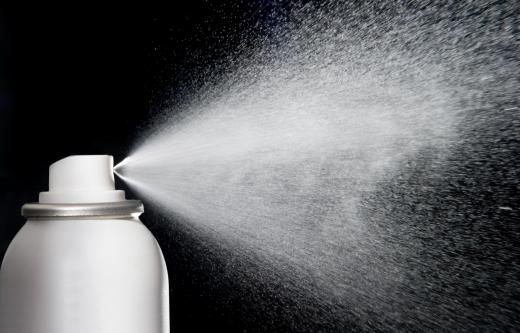A cable cleaner is a solvent-based product used to remove dirt or other contaminants from wires and cables. These products can be found in liquid, aerosol, or gel form to accommodate a wide variety of cleaning applications. Regular use of a cable cleaner helps extend the life of wires and cables and reduce replacement costs over time. Properly-maintained cables also offer a high level of performance and experience fewer outages than cables that are not subject to regular cleaning.
Electricians and other maintenance personnel may use a cable cleaner on exposed wires or the dielectric insulation surrounding the wire. It is often necessary to clean the metal wire before applying new insulation or splicing two cables. Often, the exterior insulation around these cables is subject to grease and grime from nearby equipment. Cleaning this insulation helps to minimize corrosion that can eat through the protective coating and damage the wire within. A cable cleaner can also remove corrosion inhibitors and other protective products that may be interfering with signal quality and performance.

The process of choosing cable cleaner often poses a number of challenges to maintenance personnel. Some cables or wires are used in high-temperature settings, so cleaning products must not pose a fire risk in these applications. Many cables and wires within walls or equipment are difficult to access, and reaching them requires working in confined spaces. In this type of application, solvent-based cable cleaners may cause injury or illness due to a lack of ventilation. Non-solvent cable cleaners may be required to protect workers and minimize air quality effects.
Cable cleaners should also be able to effectively remove residue without impacting the performance or durability of the signal or power transmission. Cleaners that leave residue behind may interfere with conductivity, or cause disruptions in the line. Some residue may even be flammable once power is supplied to the newly-cleaned cable. Cleaning products that damage the protective insulation around a wire can reduce energy efficiency and increase utility bills.
Products designed for marine and industrial applications may clean and lubricate cables in a single-step process. This type of cable cleaner is often used for non-electrical cables, such as those used to hoist an anchor or as part of an industrial machine. These dual-purpose cleaners remove grease and grime to extend the life of the cable, and add lubricant to maximize performance. In a marine-based application, it's also important to consider the effect that the cleaner will have on water quality. Non-toxic cleaners can be used to keep cables properly maintained without posing a risk to fish and other marine life.
